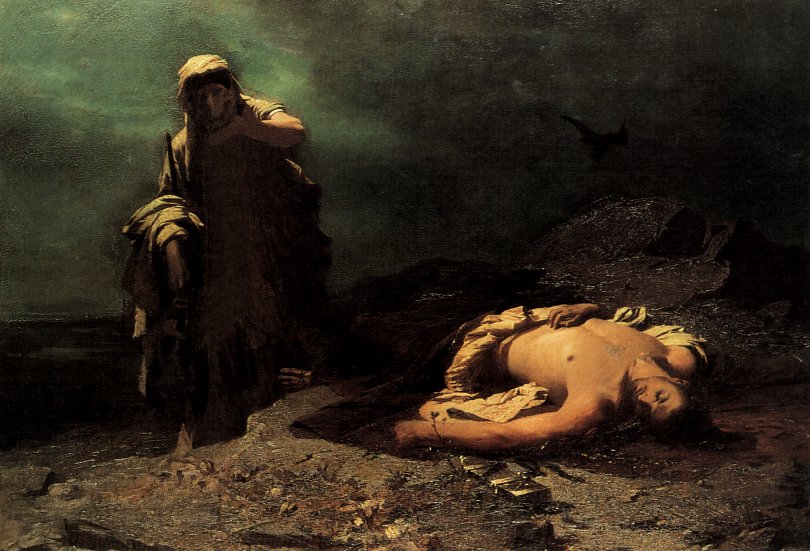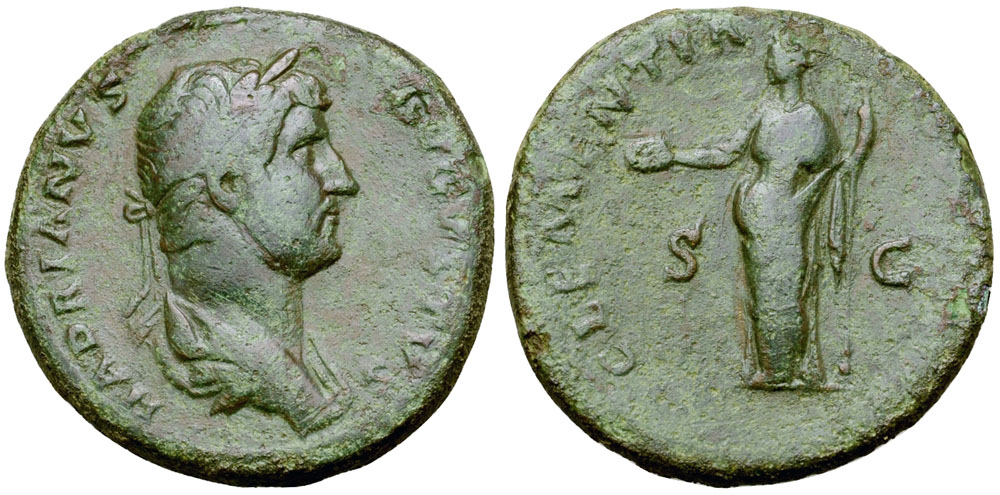CLAS 353
October 15, 2024

Some Like it Hot (Tony Curtis, Marilyn Monroe, Jack Lemmon, 1959)
Creative Project due tonight (11:59pm in D2L)
Thebaid 12: Argia & Antigone; Athenian intervention at Thebes; funerals
- Argia’s heroic journey to Thebes as Argive women appeal to Athens: “in an upsurge / of unfeminine valor [virtus], Argia nerved herself / and ignoring her gender, contrived an immense task” (12.176-8)

Lytras, Antigone in Front of the Dead Polynices (1865)
- Argia & Antigone: solidarity of sister & wife (Polynices); burning pyre ("They prayed that, whoever it was, gracious and gentle, he might / take in a guest and let their two souls and ashes combine", 12.428-9)
Thebaid 12.430-6 (hideous cremation)
Behold! brothers once more! As devouring fire first
licked his limbs, the timbers shook, pushing the newcomer off
the pyre. Flames billowed forth and, as a tip split in two,
each crown in turn glittered, each had its light torn away.
As though pallid Orcus had set two Eumenides’ brands
to brawling, each fireball threatened, each strove to outclimb
the other; the whole structure shifted its weight and moved
apart a little.
- Antigone & Argia arrested (Creon), competitive bickering & degraded heroism ("Gone the respect that had colored their speech just now, replaced—you’d / swear!—by hatred and rage, so shrilly did these two women / wrangle, dragging their captors the while before the king", 12.461-3)

Clementia (R) performing a sacrifice on coin of Hadrian (L) (132-134 CE)
- Argive mourners appeal to Athens (12.464ff.) at Altar of Mercy/Clementia): Romanized Theseus kills Creon, welcomed in Thebes; treaty & funerals; final image of Argive women grieving (cf. Iliad)
- secure peace? post-Thebaid Epigoni (Sons of Seven) restore son of Polynices to throne of Thebes (succession); nuda potestas
- Epilogue: Statius's epic-poetic confrontation with Vergil
Thebaid 12.810-19
WILL YOU LONG endure? Outliving your master, will you be read,
O my Song of Thebes, that I labored at late at night, for
twice six years? Surely present already, Fame has eased
your way and begun to show you, new-made, to the future;
already, magnanimous Caesar deigns to acknowledge you;
Italy’s eager schoolboys already recite you from memory.
Live on, I pray! Do not try to surpass the Aeneid divine,
but at a distance, follow and always revere Her imprint. [cf. Aeneid 2.711]
Soon, if some bruised Envy still spreads clouds before you, it will
set; after I’m gone, you’ll win your well-deserved honors.
GROUPS
PRESENTATION GUIDELINES
Statius, Achilleid

Achilleid: unfinished at Statius's death (96 CE); pre-publication "sample" of 12 books survives; prequel to Iliad; quasi-androgynous teenage Achilles ("a warm glow playing / on his snow-white face, his hair fairer than gold, / his first youth not yet transformed by wispy down . . . much of his mother / there in his face", 1.180ff.); Thetis takes him from centaur Chiron (wilds of Mt. Pelion, Thessaly) > Scyros (traditional story)

Chiron, Peleus, Thetis, Nereid (black-figure amphora, ca. 510 BCE)
- extending traditional heroic epic (romance, dramatic intrigue, comedy; cf. Homer's Odyssey)
- a complete Achilles ("the entire hero", 1.7) vs. uncompromising Homeric warrior?
Achilleid 1.1-19 (epic's program)
ACHILLES—bring back the story, Goddess,
of the formidable hero descended through Aeacus [grandfather of Achilles]
from thundering Jupiter, but denied His heaven,
his deeds indeed famous through Homeric song,
but with much more to celebrate. May it be
your pleasure that I encompass, as is my desire,
the entire hero, trumpeting him forth
from his hiding in Scyros and not stopping
with the dragging of Hector, but going on to hymn
the great warrior through the whole tale of Troy.
All I require from you, Phoebus Apollo,
is new springs if I have drained the old ones dry
with a worthy draught, and to wreathe my hair
a second time with auspicious laurel,
for I am not knocking at the Aonian grove [Boeotia]
as a stranger here, nor are these sacred bands
the first to augment my temples. Dirce’s land
is aware of this, and Thebes has me on her list
of venerable poets dating back to Amphion.
- praise of Domitian & polite refusal (1.20-5)
- Achilleid & tensions of binary gender: Achilles's nature vs. circumstances, i.e. essentializing vs. constructed/socially performed gender; stability of epic hero's masculinity?


L: Thetis & grieving Achilles (ca. 460 BCE); Thetis & Peleus (Attic kylix, ca. 490 BCE)
- opening: Thetis blocks Achilles's heroic destiny > "oceanic Jove" (Paris & Trojans, Helen); cf. Juno's storm, Aeneid 1
Achilleid 1.92ff. (Neptune to Thetis)
"Try not in vain, Thetis, to sink the Trojan fleet.
The Fates forbid it. Heaven has ordained that Europe
mingle bloody hands with Asia, and Jupiter
has proclaimed war, decreed years grim with slaughter.
But what a son you will see there, victorious . . ." [Iliad]

Chiron educating Achilles (Herculaneum, 1st century CE)
- Thetis's less cosmic/epic solution: pretext of retrieving Achilles from Chiron, "to dip him again in the waters of Styx" (1.151) & draft-dodging; awkward reunion,"Achilles snuggles / into [Chiron's] shaggy shoulder and arms . . ." (1.221-2)

Eros riding a dolphin (Delos, 2nd century CE)
- dolphin-ride to Scyros & comic plan: Achilles reluctant to cross-dress ("Working against her / were his father, his great tutor, and the raw ingredients / of a noble nature", 1.313ff.); glimpses princess
Achilleid 1.342-51 (Deidamia, Diana among her peers)
When the defiant boy, whose heart had never trembled,
saw this girl at the head of her troop of companions
he stiffened, and every bone in his body
absorbed liquid fire. Nor did his passion stay hidden;
no, the torch pulsing in marrow goes to his face,
tingeing his bright cheeks and glazing them with sweat.
As when the Massagetae darken their milk with blood
or when ivory is stained with crimson dye,
so too this sudden flame shows itself, reddening
his cheeks’ pallor.
cf. Aenied 12.65-7, "The tears came pouring down her flaming cheeks, / Dashing across the heat of crimson blushes; / As a blood-purple dye stains Indian ivory . . ."
- Thetis's costuming (dress, necklace, hair; "she teaches him to walk and move and speak / with modesty . . . He had beauty to spare, / though his manhood was at odds with it, and the observer / was deceived by his subtly ambiguous gender", 1.374ff.); presentation to King Lycomedes as Achilles's sister (comic plot set)
- scene shift: Greek world gathers for war, Calchas's vision (1.458ff.) – incomplete catalogue (epic vs. comedy/romance)
- Scyros: Deidamia knows "Aeacus' grandchild / under his female semblance, was in fact a man" (1.626-7) – courting & relationship?

Maenads & Dionysiac dancers (Etruria, 550-525 BCE)
- nocturnal Bacchic festival (1.664ff.): Achilles questions his masculinity – rape ("Of course the girl filled wood and mountain with her cries, / but the Bacchic cohort . . . thought it was a signal for the revel", 1.723-5); cf. Greek/Roman (New) Comedy motif of rape in patriarchal society as impulsive young male's transition to adulthood > marriage
- Achilles's pledge of "good faith" (1.729ff.) to Deidamia but remains "Peleus' daughter" & pregnancy concealed!
- Ulysses exposes Achilles in dramatic recognition scene (gifts during girls' festival performance, bugle blast, "Peleus' daughter was gone", 1.982); "adult" Achilles faces Deidamia's father, marriage pitch & presents baby Pyrrhus (1.992ff.)
- tragic & epic events ahead (Troy), e.g. foreshadowed at Thessaly's pastoral lament (1.267ff.)
Achilleid 1.1040ff. (Deidamia's farewell speech on wedding night)
"Will I ever see you again, lay my head on your chest,
Achilles? Will you ever think your safe harbor here
worthy of you? Or when you come back, swollen with pride,
bringing Trojan captives and all their possessions,
will you want to forget where you hid out as a girl . . .
. . . Go, but be careful. Remember,
Thetis was not afraid of nothing . . .
. . .
As for me, will I be in a story
you tell to your slaves, about a boy's first peccadillo,
or will I not be mentioned at all?
- end of Achilleid 1: Achilles reiterates fidelity & promise to return, "The storm winds swept his idle words away" (1.1074); Achilles's romantic future (Briseis "the bride of my heart", Iliad 9.336); Deidamia-Scyros story's place?
- Achilleid 2: heroes agree what happens in Scyros, stays in Scyros > place of story in epic tradition (2.8ff.); Achilles's narrative of past experience (cf. Aeneid 2-3), i.e. account of diet, physical education, military & musical education under Chiron, medicine & law (2.109ff.), Achilleid ends

Ariadne abandoned (fresco, Pompeii, 1st century CE)
- last glimpse of Achilles's emotional complexity
Achilleid 2.27-34 (Achilles sails from Scyros; personal desire vs. duty, etc.; cf. Dido & Aeneas, et al.)
And far away, leaning out from the top of a tower
with her weeping sisters and holding the infant Pyrrhus,
as he was named, his wife fixed her eyes on the sails.
She herself was moving on the waters, and now only she
could see the ship. Achilles too kept turning his eyes
toward the beloved walls, thinking of the widowed house
and the sobs of the deserted woman. Passion
hidden in his heart is reborn, and valor gives way.
- What if Ulysses hadn't gone to Scyros (warrior's fuller human potential & humanity)?











